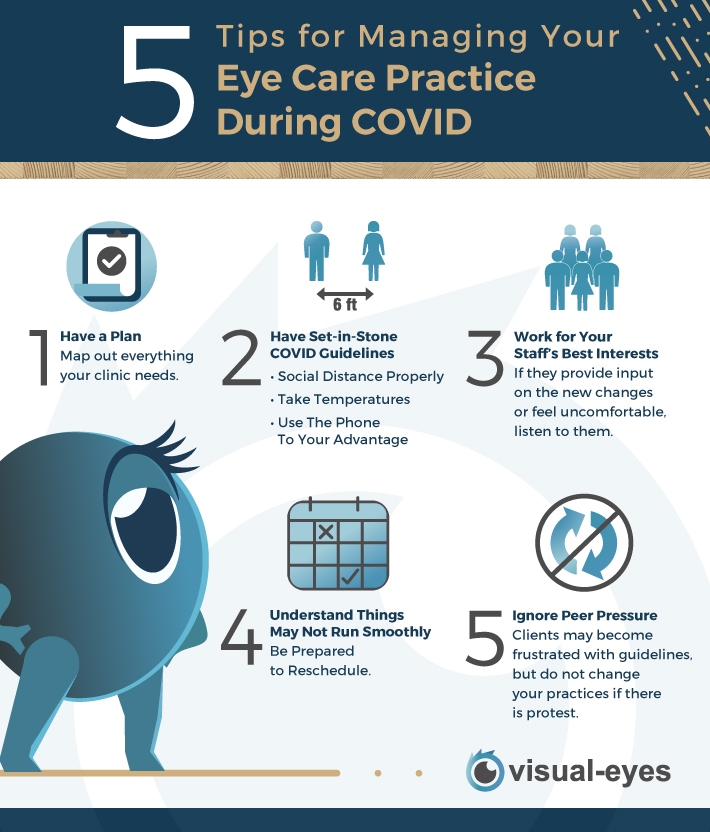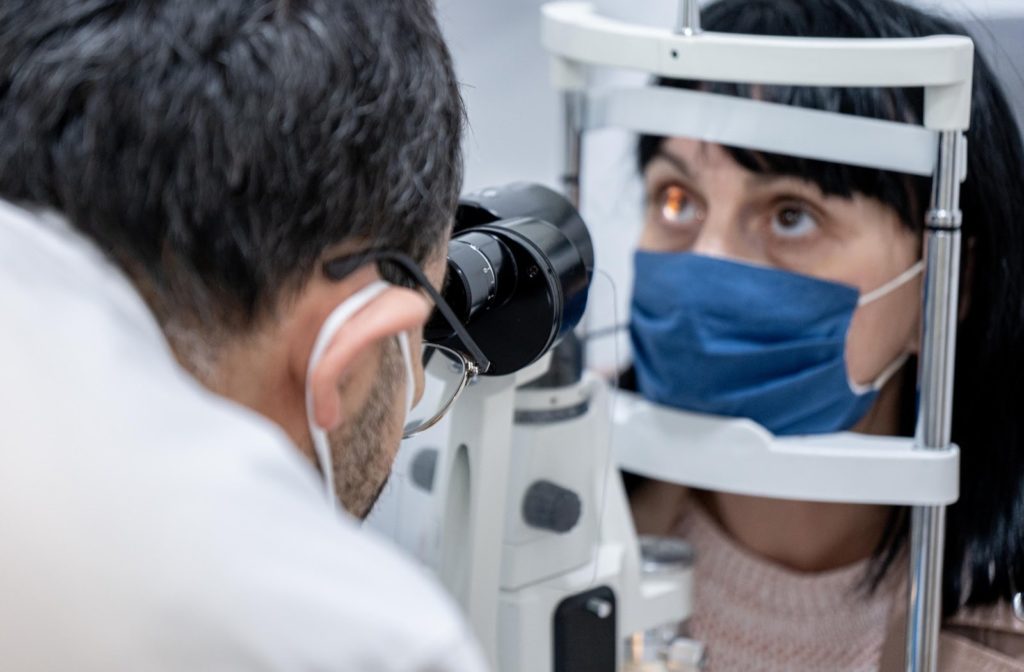To say the world has changed is an understatement, as COVID-19 has affected everyone’s life in some way. For your eye care practice, everything from invoicing to examinations may be affected, and it can be difficult to manage.
Whether your clinic recently re-opened or has been operating from the start, continue reading to learn about 5 tips for managing your eye care practice during COVID.

Have a Plan
A detailed plan is your most valuable asset for running a successful practice during a pandemic. Map out everything your clinic needs, including:
- New policies and procedures
- New equipment
- Personal protective equipment (PPE)
- Communication efforts (automated emails to clients, signs in the clinic, etc)
- Sanitation equipment
Once you implement your plan, understand it may need to be reworked or adjusted. Information regarding COVID-19 can develop rapidly, and restrictions can change just as fast. Prepare to make adjustments, but your overall plan should be concrete.
Dedicate time to inform your staff of the changes and new procedures affecting the practice. Be open to employee feedback, as they understand your practice and may have unique views you have not considered.
Have Set-in-Stone COVID Guidelines
Running a business, especially a practice where your clients need to be assessed in close contact to optometrists, requires an understanding of effective COVID-19 guidelines and prevention. Your government can assist you in covering all of the bases, but you should be prepared to:
Social Distance Properly
Social distancing is a must if you want your business to stay open and ensure the safety of your employees and clients. After a year of COVID-19, some may think keeping a proper distance is no longer required, but social distancing is an effective way to protect yourself and others from any potential transmission.
Place reminders around your practice and enforce the 2-metre distance whenever possible. Remember, you are not being overdramatic, you are being a responsible business owner.
Take Temperatures
Taking your clients’ temperatures on arrival can help prevent the spread of illness. Some may have a fever but swear they feel fine, so trusting each patient’s word may not be ideal. Get a temperature reading to ensure your practice stays safe.
Use the Phone to Your Advantage
Use cellphones to your advantage; almost everyone has one! Discussing a patient’s history is a vital part of a comprehensive eye exam, but this discussion does not need to be done in person. Use phones in the practice to speak with your patients about their medical history instead. Electronic forms is another method to receiving patients’ history without the need for an in person visit.
You can contact patients when they arrive or the day before the appointment, whichever works best for your practice. Frame this procedure change to clients as a safety caution and a convenient way for them to avoid forms at the office. If you are accepting fewer clients than normal, you will have extra time to dedicate to this.
Work for Your Staff’s Best Interests
Your staff helps your clinic run smoothly, so it is important to keep them on your mind. If they provide input on the new changes, listen to them. If certain staff members feel uncomfortable working during these uncertain times, help accommodate them as best as you can.
Your staff may face upset clients, work-related stress, or personal issues due to COVID-19, so support them and do not let their efforts go unappreciated.

Understand Things May Not Run Smoothly
You have created an action plan and you are ready to go. Remember though, we are all navigating through uncertain times, and reality may not always align with our plans. Understand that your practice may need to make last-minute changes, judgement calls, and quick decisions based on new COVID-19 information.
Embrace the fact that difficulties may lie ahead. No one can manage a practice perfectly, and this is especially true with pandemic-related changes frequently occurring.
Be Prepared to Reschedule
Rescheduled appointments happen due to many unforeseen circumstances. You may see an increase of sudden cancellations due to isolation requirements in this 3rd wave. Keep in mind your practice will recover if you lose an appointment, and it is better than if a client arrived while feeling unwell.
If clients need to reschedule, accommodate their needs as best as possible. Confirm the health of your clients when confirming appointments and you can better handle rescheduling.
Ignore Peer Pressure
COVID-19 restrictions can suddenly change, and your practice will have to adapt. Clients may become frustrated with guidelines the longer this pandemic lasts, but do not change your practices if there is protest.
The long-term health and safety of your clients, staff, and yourself is more important than any controversy. Potentially receiving a negative review means nothing if you have kept others safe.
Plan for the Long-Term
Vaccinations are being administered, but no one is sure when the COVID-19 pandemic will become a thing of the past. Until then, let these tips guide you to find the most effective process for your needs. The changes you put in place may not run smoothly at times, but perseverance will help you effectively manage your practice during this pandemic.


